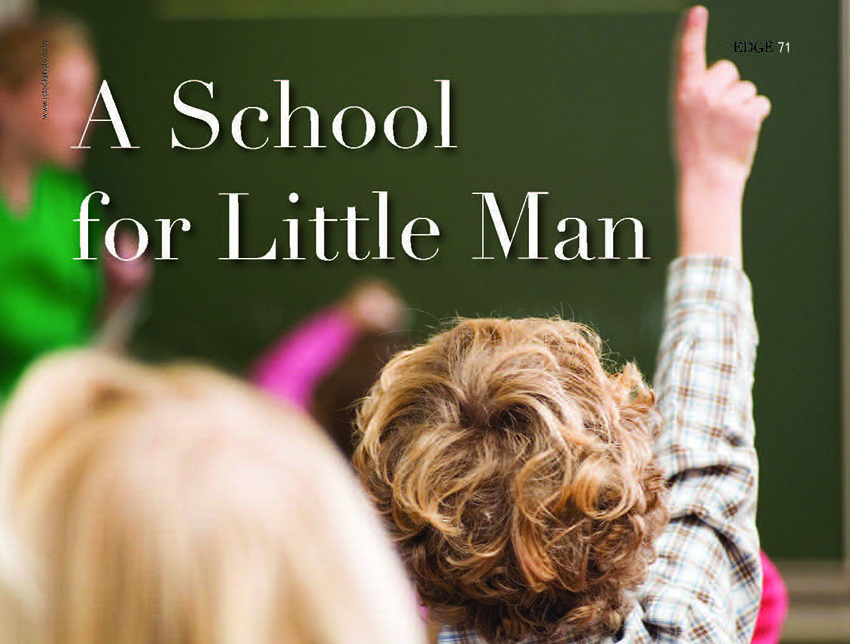
Lessons in the journey to educate our gifted and learning disabled son.
I never heard a three-year old talk like that. He sounds like a little professor. My husband and I would look at each other and smile proudly when our friends and family made remarks like these, as if we should be credited for our son’s charm and unusual precociousness. His grown-up conversational skills earned him the name “Little Man” long before he was out of diapers.
Despite Little Man’s advanced verbal skills as a toddler, he struggled in school from the start. He absolutely hated going. He refused to read and had extreme difficulty writing. We hired tutors and arranged for him to receive “extra help” at the parochial school he attended. He still continued to struggle. One day after school, Little Man ran off the bus with tear-stained cheeks and terror in his eyes. He shrieked, “He said he was going to kill me!”
We quickly learned that Tim, a student with whom Little Man was friendly, had joked with him, “Aw, man. I am going to kill you for taking the window seat.”
It was undoubtedly odd. We initially chalked it up to Little Man overreacting. After that day though, there were similar incidents at home, at school and around the neighborhood. It became obvious there was more going on with Little Man than we realized. Several months, many doctor visits and thousands of dollars later, we sat in the office of Dr. Beth Potashkin, a counselor in Scotch Plains. “Dr. Beth” was reviewing the report Johns Hopkins University’s doctors had prepared after evaluating Little Man for a full two days.
“Your son has extreme difficulty understanding nonverbal communication,” she said. “He also has other learning disabilities that severely affect his visual perception, his ability to read and write, and how quickly he can process certain kinds of information.”
Panic set in and I stopped breathing. The sound of Dr. Beth’s words dragged out in slow motion as she explained the impact these disabilities would have on Little Man’s education and the rest of his life. When I recovered enough to tune back in and decipher Dr. Beth’s words, I heard, “All that aside, they found your son is smarter than 99.9 percent of people in the area of verbal intelligence.”
Dr. Beth appropriately paused, expecting some kind of reaction. There was none. We sat stunned in silence. It was one of the rare moments in my life when I was rendered speechless. While the words wouldn’t came out, my mind was screaming What does this mean? As if she could hear my mind-scream, Dr. Beth continued, “You’re son is a ‘2E’kid…he is ‘twice exceptional.’ He is profoundly gifted and he is learning disabled. The school is going to have to accommodate his disabilities and gifts, especially in how they communicate with him, and pace teaching. Sometimes teachers will need to slow down…sometimes they will need to speed up and skip him forward a few grades in the subjects of his giftedness. It’s pretty complicated to teach 2Es. Little Man definitely is going to need an IEP.”

www.istockphoto.com
Seeing our confused faces, Dr. Beth explained, “An Individual Educational Plan.”
And that’s how the journey for Little Man’s special education began. Many, many mistakes were made along the way.
Knowing what I know now, and if finances permit, I strongly recommend you retain a special education lawyer, or consult with one before you start the process. Since I am a lawyer, I represented our family through the classification and IEP process. I know, I know. I was a fool to disregard the wise adage, “A lawyer who represents himself has a fool for a client.”
If you research special education rights on the web, you will likely come up with some variation of this paragraph:
Public schools are required to provide a “free and appropriate public education” (FAPE) in the least restrictive environment (LRE) to children who are eligible for special education…To be eligible for special education, a student must: (1) have 1 or more disabilities in specific disability eligibility categories; (2) Which adversely affect(s) educational performance; and (3) For which the student needs special education and related services.
Now, practically speaking, what does that mean for our child in the classroom? I have absolutely no idea. Much of the law I read did zero to prepare me for navigating the process. Those head-spinning special-education acronyms and jargon did not teach me how I could best advocate for Little Man. What did help was understanding what the school must do; what it could do; and what it could not do.

www.istockphoto.com
Lessons Learned
Lesson #1: Do not expect the school to tell you what the musts, coulds and could nots are. It will not happen. Of course, it is in your child’s interest to have a good relationship with the school and work together collaboratively. Just realize that, although a school must give parents a parental rights information booklet, it is not required to educate you on every step of the process. Consequently, when I finally recognized our school was not going to hold my hand through the process, I became much more effective in advocating for Little Man.
Lesson #2: You will never know everything there is to know about special education. You will be the most knowledgeable expert at the table on the most important subject: Your Child. No teacher, educational consultant or school psychologist will know more about your child than you. Don’t shy away from making requests, asking for information or voicing disagreement.
Lesson #3: A doctor’s note—or private educational evaluation stating that special education services are necessary—does not guarantee that your child becomes eligible for special education. Nor will it enable you to skip the evaluation process. These recommendations, however, often provide satisfactory documentation to the school that an evaluation to determine eligibility for special education is warranted. And, since the school can decline to evaluate your child, those recommendations may prove invaluable.
Lesson #4: An Individual Evaluation Plan (IEP) should specify the testing, evaluations and data collected to properly evaluate your child. At a minimum, the school’s evaluation will include parent and teacher interviews, a summary of your child’s educational and health history, classroom observations and other assessments, depending on the suspected learning disability. If it’s feasible, invest in a private evaluation; it is money well spent. Private evaluations usually are more thorough and targeted. Optimally, the final evaluation should identify your child’s intellectual ability in all areas; strengths and weaknesses; learning style and preferences; academic knowledge; and potential environmental barriers to learning. The evaluation should include recommendations for the IEP and give parents the knowledge needed to make specific requests of the school, which, without the private evaluation, might not otherwise be proposed.
Lesson #5: Closely monitor the IEP. It is a legally binding contract between the school and parents, acting on behalf of their child. It sets forth what the school specifically is required to do to appropriately meet your child’s unique educational needs. Even though the school is required to follow the IEP, there could be times the school won’t do so. Sometimes it’s because staff are unaware of the IEP’s requirements, or there is a shortage of staff or resources to implement the IEP. Stay vigilant and monitor if the IEP is being followed. Check with your child and his or her teachers to confirm that the IEP’s accommodations, modifications and/or therapies are being implemented. Make sure appropriately qualified staff are providing services with the frequency stated in the IEP.
Lesson #6: Do not settle for an inappropriate education. There are occasions when a school district is unable to provide an appropriate education to a student who requires special education. In these cases, parents or the school may request to “place” the student in another public school outside of the district—or send the student to a private school. In either case, the school will pay the tuition and transportation costs. Before the IEP is developed, find out what the educational capabilities are of your local school district and of other public and private schools in the area.
A Custom Fit
There is no such thing as a one-size-fits-all approach to teaching kids with learning differences. How our brains take in, process and retrieve information affects how we learn. At a recent meeting of parents of children with learning disabilities, Kathy Russo, a Westfield based educational consultant and former director of a special education school in New Jersey, asked, “Do we learn best by hearing, seeing, touching or through experiencing?”
“Differentiated instruction is a highly individualized teaching approach that meets students where they are,” Russo explains. “Teaching is tailored to the individual student’s current knowledge, strengths, weaknesses and learning preferences. Differentiated instruction has proven remarkably effective at preventing students from disappearing into the cracks at school.”
Public schools are required to provide differentiated instruction to disabled students based on FAPE requirements that are individualized to a specific child and designed to meet the child’s unique educational needs. The requirement is to provide a “free and appropriate education” (FAPE) that is individualized to a specific child and designed to meet the child’s unique educational needs.
However, as noted earlier, the possibility of public schools to provide differentiated instruction is easier said than done. That’s because public schools have to balance providing an appropriate, individualized education that is designed to meet a student’s unique educational needs with the requirement to educate disabled students in the “least restrictive environment” (i.e., a regular classroom with nondisabled peers) “to the maximum extent appropriate.” So in school districts that have small class sizes, providing differentiated instruction to disabled students while in general education classes is manageable. Faculty members are able to provide individualized attention while also educating nondisabled students.
Unfortunately, most school districts have class sizes ranging from 20 to 30 or more students. Providing true differentiated instruction in the face of these numbers can be problematic. As a result, there is increasing pressure on public schools to place students in private special education schools, at no cost to the parents. Before parents can expect a private school placement, they must demonstrate that they have given their local school district a chance to provide the appropriate support. If the core team group of the general education teacher, special education teacher and child study team members (e.g. school psychologist, learning disabilities teaching consultant, school social worker) agree with the parents, and a private school placement is warranted, parents then have to figure out which schools are appropriate for their child. And, with more than 150 special education schools in the state, finding the right school can be a rather daunting task.
Among the New Jersey schools that offer innovative programs for kids with learning differences are The Calais School, Winston Preparatory School and The Jayne S. Carmody School. Each takes a unique approach to differential education.
Founded nearly a half-century ago, The Calais School, in Whippany, serves students in grades Pre-K through 12 who have language and nonlanguage-based learning disabilities. Approved as a special education school by the New Jersey Department of Education, Calais actually works with public school districts throughout the state. It is one of the few places in the country that offers a gifted and talented program to learning disabled students. The school’s Twice Exceptional program uses differentiated instruction to build on students’ gifts, while supporting their learning differences. The New Jersey School Boards Association recently awarded Calais an Innovation in Education Award for the Twice Exceptional program.
Winston Prep was the first high school in New York City specifically devoted to students with learning disabilities. A year ago, it opened a New Jersey campus, also in Whippany. It serves students in grades 6 through 12 who have dyslexia, executive functioning and nonverbal learning disabilities. Students are grouped according to their learning needs, not by grade level. Winston Prep’s differential education approach is rooted in its “continuous feedback system” and Focus Program. Students meet every day with their counselors to discuss their academic progress. The school’s faculty convenes weekly. Based on the continuous feedback provided, IEPs are adjusted as needed.
The Jayne S. Carmody School, which opened this September, was originally conceived in 2007 as a “school within a school” by The Rumson Country Day School. The goal was to keep families together when one sibling had a language-based learning difference. A small number of academically talented students received the school’s exemplary education while benefitting from equally exceptional specialized instruction for their learning disabilities. This inclusive approach, unique among the state’s independent schools, convinced RCDS to expand the physical space and specialized faculty devoted to these students in 2015. This has enabled the Carmody School to accept more mission-fit students, who attend classes with their grade-level peers for all nonlanguage-based subjects, and follow educational plans based upon each child’s unique abilities and strengths. “We are ‘threading the needle’ in terms of the students we’re accepting for the expanded program,” says RCDS Admissions Director Kevin Nicholas. “Students must be an appropriate fit from an academic and behavioral standpoint, because we know those are the children who will thrive at the Carmody School. Unfortunately, that means we’ve had to turn some prospective families away.”
In terms of the bigger picture, parochial (or other faith-affiliated) schools in New Jersey also are an important part of the differential learning landscape. However, because they do not receive state funds and resources, they tend to have a more narrow focus—typically on students who are likely to succeed within the parameters of the programs they have created. Roselle Catholic High Catholic High School has one teacher and one aide who are devoted to students with learning differences. They are provided by the Union County Educational Services Commission. “At the beginning of the year we make sure that teachers read the confidential file on a child’s learning style and work with the guidance department and special education people to accommodate them,” says Martha Konczal, Assistant Principal of Academics. “We try to teach kids what it means to live with a mind that works differently in certain situations, and help them find different ways to make learning work for them.”
Depending on the student and his or her particular needs, many of the state’s top private schools may also offer a good fit. For example, the 133-year-old Wardlaw-Hartridge School in Edison has been supporting differential learning as part of its teaching culture longer than there has been a vocabulary to describe it. “This is a small school where you get to know your students very well, very quickly,” says Maggie Granados, the head of the middle and lower schools, and also Dean of Studies for Pre-K through 12. “So we’ve always been able, within a selective admissions environment, to accommodate different learning styles. That comes from encouraging teachers to ‘recalibrate’ for each student, to alter the format so that a student has a greater sense of engagement in the classroom—whether it’s a high-achieving learner or a struggling one.”
It’s Been Hard
Many lessons learned, and three years later, we continue to march on advocating for Little Man. Many tears have been shed along the journey. It’s been particularly life-changing for our family. We moved an hour away from friends and family to be in a town that was among the highest-rated suburban school districts in the state. The move added 90 minutes to my husband’s commute. I declined career opportunities I had long pursued during the 18-plus years I actively practiced law. Almost every day, I would think or say aloud, “I can’t wait until Little Man is classified so it can be over.” That soon became, “I’ll be so relieved when he has his IEP so it can finally end.” That later evolved into, “As soon as Little Man has the right teachers or the right doctors, it will be okay.”
I kept waiting for it to be over.
One day, it dawned on me how selfish this thinking was. It’s never going to be “over” for Little Man. He’ll be balancing his challenges and gifts for the rest of life. And no matter how many hurdles we clear for Little Man, our family is not going to cross over some imaginary finish line to the life without worry that I invented in my mind. Once I let go of this idea, I think it was the first time I started breathing since that day in Dr. Beth’s office. And while I continue to advocate for Little Man every bit as hard as I always have, I stopped putting life on hold.
Lesson #7 turned out to be by far the most profound one I learned on this journey: I had to stop surrounding Little Man in bubble-wrap. My maternal shield was not protecting Little Man from the world. It only hid him from it. My well-intended protective instinct ended up interfering with Little Man learning how to get through the rainy days. It kept him from enjoying the sunny ones, too. Ever since, I have made a conscious effort to resist the temptation to search out and diffuse potential landmines in Little Man’s world. I have moved the hyper-vigilant Momster that lurks within me to on-call status.
And now, in a peace that has emerged from acceptance, I marvel at the beautiful wonders of our intriguingly complex, brilliant and kind little boy, knowing that one day—much sooner than we will be ready for it—he will no longer be our Little Man. He will be a man. An extraordinary man. Of that, I have no doubt.
Editor’s Note: Trinitas Children’s Therapy Services provides related services supporting students in 10 counties and more than 40 school districts and private special education schools with occupational, physical and speech language therapy services. TCTS is also a resource for independent evaluations (mentioned earlier in this story). For information on evaluations, call (973) 218–6394 or email info@childtherapynj.com.





